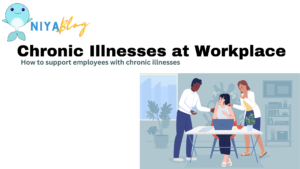
What’s it like to work where you work?
Do you feel good about coming to work?
Do you feel free and safe to speak up about your concerns?
And do you experience a healthy work- life balance?
If you have answered yes to all the questions, well then you are in a healthy work environment.
A productive workforce is one that is mentally and emotionally healthy. According to studies, employees who feel supported and safe at work perform better overall than those who do not. Businesses can create an environment where their employees feel comfortable enough to be productive and creative by recognising and addressing mental health issues.
Let’s see the importance of mentally healthy workplaces, and to see workplace mental health as a necessity rather than a nice-to-have.
Before we get into why mental health at workplace health, it’s important to first define the term mental health.
It’s a common expression, so it may surprise you that the term “mental health” is frequently misunderstood. Mental health is frequently used as a replacement for mental health conditions such as depression, anxiety disorders, schizophrenia, and others. According to the World Health Organization, mental health is a state of well-being in which each individual realises his or her own potential, can cope with normal life stresses, can work productively and fruitfully, and can contribute to his or her community.
Imagine mental health as a spectrum, with everyone’s mental health varying throughout their lives, and for some, even on a daily basis. Mental health exists on a broad spectrum, or range, ranging from positive, healthy functioning at one end (the green end) to severe symptoms or conditions that may interfere with daily life and activities at the other end (the red end). So, mental health is more than just the absence of a mental health condition; it is about being cognitively, emotionally, and socially healthy, about the way we think, feel, and develop relationships.
People at the green end of the spectrum tend to be resilient and happy. This is not to say that they never face mental health challenges; rather, they use a variety of coping mechanisms and supports to effectively manage any difficulties that arise.
Now let’s look at why is workplace mental health important?
When we do good work, it gives us a sense of purpose, belonging, achievement, and self-esteem. Our working lives have an impact on our mental health.
Every minute spent at work on mental health benefits everyone, including the company’s bottom line.
Business Benefits-
- Return on investment – For every penny spent to improve mental health at work, you can expect to receive up to double back in increased productivity and savings from fewer workers’ compensation claims.
- Attract and retain good employees – According to research, working in a mentally healthy environment is the second most important factor when looking for a job. Employees are also less likely to switch jobs.
- Reduced absenteeism – Employees take fewer days off, saving your company money.
- Improved productivity – Employees in mentally healthy workplaces are more committed to their organisation and work harder.
- Competitive lead – Your company has an added benefit because it sets you apart from your competitor with a great culture and people who want to be a part of it.
Employee Benefits–
- Acceptance – A positive and inclusive workplace culture empowers employees to be themselves and feel like they belong.
- Job satisfaction – Working in a mentally healthy workplace provides people with a stronger sense of purpose, accomplishment, and pride in their work.
- Social connection – A welcoming workplace encourages co-workers to socialise and get to know one another.
- Better support – Employees in a mentally healthy workplace will know how to access mental health support services if necessary and will feel comfortable doing so. Seeking help early improves mental health outcomes.
- Clarity in roles – Everyone will understand what is expected of them in their role and why.
- Recovery – Workers suffering from mental illness receive improved care. People heal faster when they recover and feel supported with resources at work.
Now, let’s understand some signs of a healthy and a good workplace.
Some indicators of a healthy workplace are obvious, while others are more subtle.
- Employees Believe They Can Speak Up
Your employees will feel confident speaking up about a variety of situations in a healthy workplace. Accommodation requests, feelings of burnout, errors and project challenges, concerns about other employees, and compensation queries are all relevant issues that may arise. These are challenging things to discuss since they can all cause conflict in the workplace.
- Everyone is committed to transparency and accountability.
Transparency and accountability are also practices in a good workplace. In other words, people admit their errors and bring everyone up to date on project statuses.
- Supervisors check in with employees on a regular basis.
There is a perfect blend between micromanagement and under management. Supervisors in a healthy workplace will allow their employees to be independent and will respect them as adults. They will, however, check in from time to time to ensure that there are no outstanding questions, complaints, or issues.
- Development and expression are encouraged.
A healthy workplace encourages its employees to grow and learn. Employees will flourish in positions and responsibilities that are a good fit for their abilities and interests. A person who is stuck in a job they despise will leave for someone who values their abilities and needs.
- Management promotes work-life balance.
Finally, a healthy workplace will respect their staff as important resources and ensure that they are performing to their full potential. This includes maintaining a healthy work-life balance. A healthy work-life balance reduces burnout by encouraging employees to care for themselves physically and mentally.
While workplaces are required to care for their employees’ mental health and may even have strategies in place to support them, there is still a stigma associated with mental health, which may make employees hesitant to open up to their colleagues or managers and admit they need help.
So, how can employers look after and support their employees during this difficult time if mental health is still considered a ‘taboo’ topic?
- ‘Normalize’ workplace mental health
Employees suffering from poor mental health may be afraid to speak up because they are concerned about how it will affect their employment or how their employer will perceive them. The key to addressing these fears is to f foster a culture in which mental health is regarded as equally important as physical safety, rather than as a secondary concern. This can be accomplished by:
- Discussing workplace mental health in the same way that we discuss workplace safety, performance, and productivity.
- Creating a culture that values healthy behaviours such as reasonable work hours, respectful communication, healthy eating, and physical activity.
- Providing workers with clarity on their mental health leave entitlements.
- Encouraging open and honest discussion about practises or issues that are causing concern or stress.
- Making the Workplace Mentally Healthy
Mental health influences how we live our lives, including how we work. When people’s mental health is good, they are productive, happy, and healthy, and they can bounce back from whatever life throws at them. However, when it is low, it can be difficult to function on a daily basis and find meaning in our work and lives.
This can be achieved by-
- Encourage a work-life balance.
Praising employees who work late and arrive early, or expecting them to work from home in the evenings, is detrimental to your company’s long-term success. Employees are more likely to burn out if they do not maintain a healthy work/life balance.
Ask employees to take regular vacations where they can unplug from the office. Don’t expect everyone to respond to emails around the clock.
Encourage everyone to live a rich, full life outside of the office. People who have hobbies, spend time with loved ones, and take care of themselves make better employees.
- Create a culture of connection through check-ins- Ask detailed inquiries regarding the types of supports that would be beneficial rather than simply saying, “How are you?” Wait for the complete response. Encourage inquiries and concerns while paying close attention.
- Clinical mental health screenings and assessments- Clinical screenings by mental health professionals, who provide feedback and clinical referrals as needed. The effort required to seek evaluation and treatment can otherwise be a barrier.
- Organize Training Programmes-Employees should receive in-service training on self-care, stress management, and resilience. Hiring a mental health professional to give half-day workshops a few times a year could help prevent problems and emphasize the importance of incorporating healthy strategies into your daily life.
As an employee, what can you do?
Employees should encourage employers to provide stress management education and mental health programs that meet their needs and interests in order to promote mental well-being at work.
Employees should also be aware of policies governing how to take a mental health day off from work if the need arises.
In addition, here are some strategies that employees can use to promote mental health at work-
- Discuss highs and lows with others. Employees can share more of their personal experiences with other coworkers as appropriate to help lessen the stigma surrounding mental health. Coworkers can’t take the place of mental health professionals; this is more about expressing than going into details.
- Work on healthy coping skills during the workday. Employees can practise skills that promote healthier mindsets, relationships, and self-image to cope with daily workplace stressors.
Coping mechanisms may include:
- Relaxation Exercises like -Deep breathing
- Using Healthy communication
- Prioritization and focusing on one task at a time to avoid feeling overwhelmed
- Using positive self-talk
- Nurturing social relationships at work is critical to preventing social isolation and loneliness in the workplace.
- Participate in programs, assessments and activities sponsored by your employer. Employees should take advantage of corporate initiatives to develop new skills and get the assistance they require.







